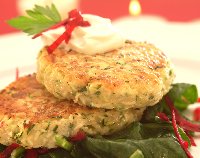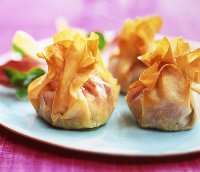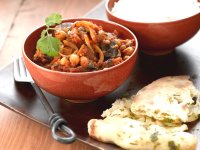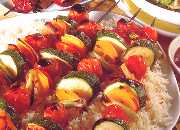Why I'm a Vegetarian and more
Why am I a vegetarian? There are a myriad of reasons, and I will try and articulate a few here.
Firstly, I want to give a definition of what a vegetarian is, as there are many common misconceptions about vegetarians:
A vegetarian is someone living on a diet of grains, pulses, nuts, seeds, vegetables and fruits with or without the use of dairy products and eggs (preferably free-range). A vegetarian does not eat any meat, poultry, game, fish, shellfish or crustacea, or slaughter by-products such as gelatine or animal fats.
For further details on vegetarianism visit the Vegetarian Society website. There you can find information on labelling, shopping and eating out, recipes, health and general info that will help you become a vegetarian (if that's what you are looking to do! If you’re not, the site will at least help you understand the vegetarians in your life).
One thing I have to do being a vegetarian is read the ingredients of food products before I buy them. There are some ingredients that can act as stumbling blocks:
Many foods contain ingredients derived from the slaughter of animals. Gelatine is made from animal ligaments, tendons, bones etc., which have been boiled in water. It is often found in confectionery, ice cream, and other dairy products. Animal fats refer to carcass fats and may be present in a wide range of foods, including biscuits, cakes, and margarines. Suet and lard are types of animal fats. Certain food additives (E numbers) may be derived from animal sources. Cheese is generally made with rennet extracted from the stomach lining of slaughtered calves. Vegetarian cheese is made with rennet from a microbial source. (Taken from the Vegetarian Society)
I also try and buy organic and free-range eggs when I can as I object to the battery farming of hens.
Vegetarian food groups are:
Cereals/grains - wheat (bread & pasta), oats, maize, barley, rye, rice, etc.
Pulses - kidney beans, baked beans, chick peas, lentils, etc.
Nuts & Seeds - almonds, walnuts, hazelnuts, sesame seeds, sunflower seeds, etc.
Fruit & vegetables
Dairy products or Soya products - tofu, tempeh, Soya protein etc
Vegetable oils and fats - margarine or butter
A typical vegetarian diet closely matches expert dietary recommendations for healthy eating, being low in saturated fat and high in fibre, complex carbohydrates, and fresh fruit and vegetables. One thing you have to watch though is not to eat too many high fat dairy products. You can read more about this problem here
It is also important in any diet to make sure you have enough vitamins and iron. Good sources of iron for vegetarians include wholegrain cereals, leafy green vegetables, blackstrap molasses, pulses such as lentils and kidney beans, and some dried fruits (such as apricots). Read more here. I have been a vegetarian my whole life and never been iron deficient or anaemic.
For further info on basic vegetarian nutrition read here
Ok, so I've been a vegetarian my whole life. My parents decided to become vegetarians in the 1970s and brought us up eating healthy food (organic where possible). Eating didn’t just mean a vegetarian diet - it meant wholefoods and no 'junk' food (though that rule lapsed as we approached adolescence). I have many fond memories of home baking and trips to local farms for the freshest milk and vegies. I was lucky to have a mother who was an excellent cook and teacher.
So the first reason I am a vegetarian is that I was brought up that way and it's what I'm used to. My body isn't used to processing meat and if I eat a little by mistake I usually end up feeling sick. We were always given the option to eat meat if we wanted to, as we grew older.
As I got older I made a more conscious decision to continue to be a vegetarian. I continue to not like the taste of meat. The smell of the blood and the flesh (esp. when it's not fresh) makes me feel sick. I also choose not to eat meat for health reasons. A high meat content diet has been shown not to be a healthy choice. It has also been shown that you can lead a perfectly healthy life as a vegetarian. In the society I live in it is an option to be a vegetarian - I don't have to eat meat to survive. I know I'm lucky to have that choice and privilege.
Many people become vegetarian because they believe it is wrong to slaughter animals for food (I don't like the MASS slaughter and wastage) and because they are opposed to the cruelty and suffering inflicted upon the billions of animals reared for food. I hate walking past the meat aisle in the supermarket; masses of packages of meat that no one associates with once being a living being.
Another reason people cite for becoming vegetarian is the effect of meat production on the environment, such as the destruction of vast areas of rainforest for cattle ranching, is another reason commonly cited for becoming vegetarian. Others may become vegetarian because of the links between meat production and poverty and famine in developing countries. Religious reasons are also a factor for some people.
I would like to see the day when most people were vegetarians, and we only ate meat on occasions or to survive. If people must eat meat I’d prefer they hunted and killed the animals themselves, or at least ate meat sourced from local farmers and butcher. At the moment people are too divorced from the killing process. I often say to people, "Could you kill an animal?" I know that I could kill a chicken or a fish, if I had to, so I feel I could eat either if I needed to (unfortunately or fortunately I still don't like the taste of them). I couldn't kill a pig or cow or lamb on an average day - I hope I never have to!
Below are some great Vegetarian recipes (you can find many more on the Vegetarian Society website including Christmas recipes, Halloween & Bonfire Night and Flaming Hot Veg BBQs )
 Courgette Latkes with Cream Cheese and Grated Beetroot
Courgette Latkes with Cream Cheese and Grated Beetroot
 Goats’ Cheese and Cranberry Parcels
Goats’ Cheese and Cranberry Parcels

Aubergine, Potato and Chick Pea Balti (Birmingham Balti)

Individual Mushroom & Artichoke Tarts
 Marinated Halloumi Cheese Skewers with Mediterranean Vegetables
Marinated Halloumi Cheese Skewers with Mediterranean Vegetables
Firstly, I want to give a definition of what a vegetarian is, as there are many common misconceptions about vegetarians:
A vegetarian is someone living on a diet of grains, pulses, nuts, seeds, vegetables and fruits with or without the use of dairy products and eggs (preferably free-range). A vegetarian does not eat any meat, poultry, game, fish, shellfish or crustacea, or slaughter by-products such as gelatine or animal fats.
For further details on vegetarianism visit the Vegetarian Society website. There you can find information on labelling, shopping and eating out, recipes, health and general info that will help you become a vegetarian (if that's what you are looking to do! If you’re not, the site will at least help you understand the vegetarians in your life).
One thing I have to do being a vegetarian is read the ingredients of food products before I buy them. There are some ingredients that can act as stumbling blocks:
Many foods contain ingredients derived from the slaughter of animals. Gelatine is made from animal ligaments, tendons, bones etc., which have been boiled in water. It is often found in confectionery, ice cream, and other dairy products. Animal fats refer to carcass fats and may be present in a wide range of foods, including biscuits, cakes, and margarines. Suet and lard are types of animal fats. Certain food additives (E numbers) may be derived from animal sources. Cheese is generally made with rennet extracted from the stomach lining of slaughtered calves. Vegetarian cheese is made with rennet from a microbial source. (Taken from the Vegetarian Society)
I also try and buy organic and free-range eggs when I can as I object to the battery farming of hens.
Vegetarian food groups are:
Cereals/grains - wheat (bread & pasta), oats, maize, barley, rye, rice, etc.
Pulses - kidney beans, baked beans, chick peas, lentils, etc.
Nuts & Seeds - almonds, walnuts, hazelnuts, sesame seeds, sunflower seeds, etc.
Fruit & vegetables
Dairy products or Soya products - tofu, tempeh, Soya protein etc
Vegetable oils and fats - margarine or butter
A typical vegetarian diet closely matches expert dietary recommendations for healthy eating, being low in saturated fat and high in fibre, complex carbohydrates, and fresh fruit and vegetables. One thing you have to watch though is not to eat too many high fat dairy products. You can read more about this problem here
It is also important in any diet to make sure you have enough vitamins and iron. Good sources of iron for vegetarians include wholegrain cereals, leafy green vegetables, blackstrap molasses, pulses such as lentils and kidney beans, and some dried fruits (such as apricots). Read more here. I have been a vegetarian my whole life and never been iron deficient or anaemic.
For further info on basic vegetarian nutrition read here
Ok, so I've been a vegetarian my whole life. My parents decided to become vegetarians in the 1970s and brought us up eating healthy food (organic where possible). Eating didn’t just mean a vegetarian diet - it meant wholefoods and no 'junk' food (though that rule lapsed as we approached adolescence). I have many fond memories of home baking and trips to local farms for the freshest milk and vegies. I was lucky to have a mother who was an excellent cook and teacher.
So the first reason I am a vegetarian is that I was brought up that way and it's what I'm used to. My body isn't used to processing meat and if I eat a little by mistake I usually end up feeling sick. We were always given the option to eat meat if we wanted to, as we grew older.
As I got older I made a more conscious decision to continue to be a vegetarian. I continue to not like the taste of meat. The smell of the blood and the flesh (esp. when it's not fresh) makes me feel sick. I also choose not to eat meat for health reasons. A high meat content diet has been shown not to be a healthy choice. It has also been shown that you can lead a perfectly healthy life as a vegetarian. In the society I live in it is an option to be a vegetarian - I don't have to eat meat to survive. I know I'm lucky to have that choice and privilege.
Many people become vegetarian because they believe it is wrong to slaughter animals for food (I don't like the MASS slaughter and wastage) and because they are opposed to the cruelty and suffering inflicted upon the billions of animals reared for food. I hate walking past the meat aisle in the supermarket; masses of packages of meat that no one associates with once being a living being.
Another reason people cite for becoming vegetarian is the effect of meat production on the environment, such as the destruction of vast areas of rainforest for cattle ranching, is another reason commonly cited for becoming vegetarian. Others may become vegetarian because of the links between meat production and poverty and famine in developing countries. Religious reasons are also a factor for some people.
I would like to see the day when most people were vegetarians, and we only ate meat on occasions or to survive. If people must eat meat I’d prefer they hunted and killed the animals themselves, or at least ate meat sourced from local farmers and butcher. At the moment people are too divorced from the killing process. I often say to people, "Could you kill an animal?" I know that I could kill a chicken or a fish, if I had to, so I feel I could eat either if I needed to (unfortunately or fortunately I still don't like the taste of them). I couldn't kill a pig or cow or lamb on an average day - I hope I never have to!
Below are some great Vegetarian recipes (you can find many more on the Vegetarian Society website including Christmas recipes, Halloween & Bonfire Night and Flaming Hot Veg BBQs )
 Courgette Latkes with Cream Cheese and Grated Beetroot
Courgette Latkes with Cream Cheese and Grated Beetroot Goats’ Cheese and Cranberry Parcels
Goats’ Cheese and Cranberry Parcels
Aubergine, Potato and Chick Pea Balti (Birmingham Balti)

Individual Mushroom & Artichoke Tarts
 Marinated Halloumi Cheese Skewers with Mediterranean Vegetables
Marinated Halloumi Cheese Skewers with Mediterranean Vegetables

5 Comments:
One danger for vegetarians is that meat - in my opinion a wonderful food as it contains almost everything the human body needs - as it is derived from grass etc - is that certain amino acids are not easy to obtain (there are about 2) other than from meat consumption - I forget which ones -but they are essential in constructing various proteins) ) - now these are essential for growth at certain age in children. (Adults don't need them - I mean these particular amino acids)). (They can be obtained from nuts etc but it is not always easy to get such food in he right quantities - and some people are allergic to nuts - in fact some people can die from being near nuts and other "healthy" vegetables - just as indeed some are allergic to milk and undoubtedly some to meat).
The other problem that can happen - even if a meat eating person only reduces meat consumption is a depletion of B12. (And also sometimes other B vitamins and Iron - but B12 is one of the most difficult to obtain). Now the effects of that are both immediate and long term - the long term effects are or can be quite dangerous and take place over about 8 or so years. I read up on this as at one as stage - when I was eating to plan so to speak I reduced meat consumption and my B12 levels dropped* - this BTW can also be caused by problems absorbing B12 and a lot of older people have B12 injections.
If you are used to a vegetarian diet and are getting all those amino acids and iron etc then that is great - but it is a fact that the Japanese and others who didnt eatmch meat up to say 1950 were always very small - comppared to kiwis and Aussies - and nowadays with the incresaed availability of meat they are on average taller and stronger and healthier. They also look healthier as do those Indians who eat meat more than they could in the old days - the Vegans always look a bit wan...but this is a subjective impression.
It is a myth that meat is in any way harmful to the body - we have been eating meat for thousands of years.
While - as I said I don't condone cruelty to animals - we have to be realistic - we are omnivores -
you will have us feeling guilty about eating carrots next!
"Hear the carrots screaming!!"
* But at school I was interested in biology and was top in thar subject in my last year at school - so I was intertested in science and literature etc (Although I dropped science quickly at University as I couldn't do the practical experiments etc - I was more of a theoretician so to speak - and not that good hat or at maths either (but I could pass exams in maths) so while I have always been interested in science etc I was never very brilliant "at it" so to speak.. )
However - from purely health point of view -a diet that is more biased toward more fruit, vegetables and so on is good - especially for people who are consuming too much butter and bread - but this doesn't mean some butter and bread cosumption is "bad" it is a matter of degree.
I also have enjoyed many vegetarian based or "oriented" meals - but I prefer - almost always to have meat with my meals and I love margarine and butter, but I realise that over consumption of butter (and other related foods) etc can lead to obesity and the problems associated esp. If one is relatively inactive.
Certainly we all need to eat more fruit and vegetables.
It is true people are divored from the killing process - but a degree of 'hardness' or abstraction - is needed - we simply cant live if we feel the pain of everything that lives and dies - that would be madness. We are animals - and we eat -simeple as that.
But unnecessary cruelty to animals I dont like - but I see meatworks etc as necessary. Cattle were produced by husbandry...they were bred for us to use there milk and to eat them -simple as that - animals eat other animals - simple - this vegetarianism (while admirable in some ways) can be seen as a rather reactionary and dubius notion. It is unfortunately a case of the surival of the fittest.
It may be survival of the fittest but we don't need meat to survive.
I've been a vegetarian my whole life and never been iron or B12 deficient. It's about having a well balanced diet whether you are a vegetarian or not and making sure you include a lot of fresh, preferably raw, veggies and fruit.
Great foods for vegetarians are yeast, molasses, nuts, seeds, Soya products, pulses and beans and lots of leafy greens (also dairy for protein and B12 and calcium).
Look at this link re iron absorption: http://www.vegsoc.org/info/iron.html
Foods rich in vitamin C, i.e. citrus fruits, green peppers, and fresh leafy green vegetables. Citric acid, sugars, amino acids can promote iron absorption. Good sources of iron for vegetarians include wholegrain cereals and flours, leafy green vegetables, blackstrap molasses, pulses such as lentils and kidney beans, and some dried fruits.
Read this link on B12:
http://www.vegsoc.org/info/b12.html
Good sources of vitamin B12 for vegetarians are dairy products or free-range eggs. ½ pint of milk (full fat or semi skimmed) contains 1.2 µg. A slice of vegetarian cheddar cheese (40g) contains 0.5 µg. A boiled egg contains 0.7 µg. Fermentation in the manufacture of yoghurt destroys much of the B12 present. Boiling milk can also destroy much of the B12.
Vegans are recommended to ensure their diet includes foods fortified with vitamin B12. A range of B12 fortified foods are available. These include yeast extracts, vegetable stock, veggie burger mixes, textured vegetable protein, Soya milks, vegetable and sunflower margarines, and breakfast cereals.
Very interesting post.
Post a Comment
<< Home